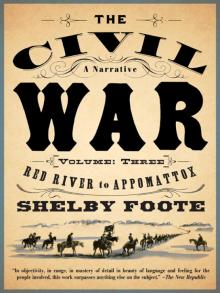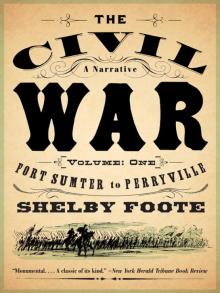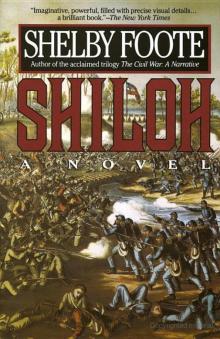- Home
- Shelby Foote
The Civil War: A Narrative: Volume 2: Fredericksburg to Meridian Page 11
The Civil War: A Narrative: Volume 2: Fredericksburg to Meridian Read online
Page 11
So he said. But while he and his three brigades were waiting for that “good regiment,” Forrest and his troopers were riding hard for the Tennessee and eluding the columns approaching cautiously from Corinth and Fort Henry. All in high spirits on New Year’s Day—except possibly the captain who by now had been verbally blistered for taking yesterday’s rear-guard companies up the wrong road and thus permitting the Federals to march past him unobserved—they reached Clifton about midday, raised the sunken flatboats, and were across the icy river before dawn. The basis for their high spirits was a sense of accomplishment. They had gone out as green recruits, miserably armed, and had returned within less than three weeks as veterans, equipped with the best accouterments and weapons the U.S. government could provide. In the course of a brief midwinter campaign, which opened and closed with a pontoonless crossing of one of the nation’s great rivers, and in the course of which they more than made up in recruits for what they lost in battle or on the march, they had killed or paroled as many men as they had in their whole command and had kept at least ten times their number of bluecoats frantically busy for a fortnight. Besides the estimated $3,000,000 they had cost the Federals in wrecked installations and equipment, they had taken or destroyed 10 guns and captured 10,000 rifles and a million badly needed cartridges. Above all, they had accomplished their primary assignment by cutting Grant’s lifeline, from Jackson north to the Kentucky border. They saw all this as Forrest’s doing, and it was their pride, now and for all the rest of their lives—whether those lives were to end next week in combat or were to stretch on down the years to the ones they spent sunning their old bones on the galleries of crossroads stores throughout the Deep and Central South—that they had belonged to what in time would be known as his Old Brigade.
Pemberton was highly pleased, not only with the results of this cavalry action outside the limits of his department, but also with another which had been carried out within those limits and which he himself had designed as a sort of companion piece or counterpart to the raid-in-progress beyond the Tennessee line. Both had a profound effect on the situation he had been facing ever since he called a halt and began intrenching along the Yalobusha, preparatory to coming to grips with Grant’s superior army: so profound an effect, indeed, that it presently became obvious that if he and Grant were to come to grips, it would be neither here nor now. Like that of the first, the success of this second horseback exploit—which in point of fact was simultaneous rather than sequential, beginning later and ending sooner—could also be summed up in three nouns, though in this case the summary was even briefer, since all three were single-syllabled: Earl Van Dorn.
“Buck” Van Dorn, as he had been called at West Point and by his fellow officers in the old army, had leaped at the chance for distinction, not only because it was part of his nature to delight in desperate ventures, but also because he was badly in need just now of personal redemption. After a brilliant pre-Manassas career in Texas, he had been called to Virginia, then reassigned to Arkansas, where his attempt at a double envelopment had been foiled disastrously at Elkhorn Tavern. Crossing the Mississippi after Shiloh, he had suffered an even bloodier repulse at Corinth in October, which gave him so evil a reputation in his home state that a court had been called to hear evidence of his bungling. Although he was cleared by the court, the government soon afterwards promoted Pemberton over the head upon which the public was still heaping condemnations. The accusation that he was “the source of all our woes,” Senator Phelan wrote President Davis, was “so fastened in the public belief that an acquittal by a court-martial of angels would not relieve him of the charge.” Van Dorn was depressed, but he was not without hope. A court-martial of angels was one thing; a brilliant military exploit, characterized by boldness and attended by great risk, was quite another. So when Pemberton summoned him to army headquarters and gave him his assignment—an all-out raid on Grant’s communications and supply lines, including the great depot lately established at Holly Springs—the diminutive Mississippian saw in it the opportunity to retrieve his reputation and bask once more in the warmth of his countrymen’s affection. Always one to grasp the nettle danger, he embraced the offered chance without delay.
He left Grenada on December 18 with 3500 cavalry, heading east at first to skirt Grant’s flank, then north as if for a return to Corinth. Next day, however, he turned west beyond New Albany and came thundering into Holly Springs at dawn, December 20. The Federal commander there, Colonel R. C. Murphy, had been placed in a similar uncomfortable position in September at Iuka, which he had abandoned without a fight or even destruction of the stores to keep them from falling into enemy hands. Grant had forgiven him then because of his youth and inexperience, and now he was given another chance to prove his mettle. He did no better. In fact, despite advance warning that a heavy column of graybacks was moving in his direction, he did far worse. This time, he lost not only the stores in his charge but also the soldiers, 1500 of whom were captured and paroled on the spot by the jubilant rebels, caracoling their horses at the sight of the mountains of food and equipment piled here for Grant’s army. “My fate is most mortifying,” he reported that night amid the embers which were all that remained of the million-dollar depot of supplies. “I have done all in my power—in truth, my force was inadequate.”
Grant reacted “with pain and mortification” at the news of his loss and ordered Murphy dismissed from the service, as of “the date of his cowardly and disgraceful conduct.” With Forrest loose on the railroad north of Jackson that same day, and his own wife spared embarrassment at Holly Springs only because she had left to join him in Oxford the day before, Grant began to design combinations of forces in North Mississippi, not unlike those already sent out after Forrest in West Tennessee, to accomplish Van Dorn’s destruction before he could return to safety behind the Yalobusha. “I want those fellows caught, if possible,” he said.
The trouble with this was that by the time the various columns could be put in motion Van Dorn was no longer in North Mississippi. Instead of racing for home, and perhaps into the arms of superior forces already gathering in his rear, he pushed on northward into Tennessee. Before he left his native state, however, the commander of a small outpost at Davis Mill, twenty miles north of Holly Springs and just south of the Tennessee line, gave him—and, incidentally, Murphy—a lesson in how well an “inadequate” force could hold its own against “overwhelming” numbers. His name was Colonel W. H. Morgan and he had less than 300 men for the defense of a point made critical by the presence of a trestle by which the Mississippi Central crossed Wolf River. Hearing that the raiders were coming his way, he converted an old sawmill into a blockhouse, reinforcing its walls with cotton bales and crossties, and a nearby Indian mound into a moated earthwork, both of which covered the railroad approach with converging fire. About noon of the 21st, the Confederates came up and launched a quick assault, which was repulsed. After a two-hour long-range skirmish, finding the fire too hot for a storming party to reach and ignite the trestle, let alone cross the river, the attackers sent forward, under a flag of truce, a note asking whether the defenders were ready to surrender. Morgan replied with what he later termed “a respectful but decided negative,” and the Confederates withdrew, leaving 22 dead and 30 wounded on the field, along with another 20 prisoners who had ventured up too close to be able to pull back without exposing themselves to slaughter. Morgan’s loss was 3 men slightly wounded.
Except for the further damage it did to his former opinion that one Southerner was worth ten Yankee hirelings in a scrap, Van Dorn was not greatly disturbed by this tactical upset. In the course of his approach to the fight, and even while it was in progress, he had done the railroad enough damage to be able to afford to let the trestle go. Bypassing Morgan’s improvised blockhouse, he crossed upstream and pushed on northward between Grand Junction and LaGrange, where he tore up sections of the Memphis & Charleston for good measure. Near Bolivar on the 23rd, he circled Middleburg, still ripping up tra
ck and wrecking culverts, and headed back south on Christmas Eve, riding through Van Buren and Saulsbury to re-enter Mississippi. South of Ripley on Christmas Day, he had a brush with one of the converging Union colums, but pressed on without delay, through Pontotoc and thence on back to Grenada, which he reached by midafternoon of December 28. He had carried out his mission in fine style, destroying Grant’s reserve supplies of food, forage, and munitions. What was more, at least from a particular point of view, he had refurbished his tarnished reputation. Households which formerly had mentioned his name only with frowns of disapproval or downright scowls of condemnation now drank his health with shouts of joy and praised him to the skies.
Pemberton, then, was delighted at the manner in which Van Dorn had achieved redemption; but not Grant, who paid the bill which thus was added to all that Forrest was costing him simultaneously. With Columbus in a panic, Memphis cowed by heavy guns, his communications disrupted, and his supply line almost a continuous wreck from Holly Springs north to the Kentucky border, he was stymied and he knew it. Van Dorn having destroyed his supplies on hand and Forrest having made it impossible for him to bring up more, he could neither move forward nor stand still. There was no way he could go but back, and this he proceeded to do, meanwhile solving the problem of immediate subsistence by sending out “all the wagons we had, under proper escort, to collect and bring in all supplies of forage and food from a region of fifteen miles east and west of the road from our front back to Grand Junction.” At the news of this, the broad smiles caused by Van Dorn’s coup faded from the faces of the people around Oxford. Their former mocking question, “What will you do now?” was changed to: “What are we to do?” Grant replied that he had done his best to feed his soldiers from their own northern resources, but now that these had been cut off “it could not be expected that men, with arms in their hands, would starve in the midst of plenty.” In short, as he said later, “I advised them to emigrate east, or west, fifteen miles and assist in eating up what we left.”
To his amazement—for he had thought the pickings would be slim and had lately advised his government that an army could not “subsist itself on the country except in forage”; “Disaster would result in the end,” he had predicted—the wagons returned heavy-laden with hams, corn on the cob, field peas and beans, sweet and Irish potatoes, and fowls of every description, accompanied by herds of beef on the hoof. “It showed that we could have subsisted off the country for two months instead of two weeks without going beyond the limits designated,” he subsequently wrote, adding: “This taught me a lesson.”
The knowledge thus gained might prove to be of great use in the future, but for the present one thing still bothered him beyond all others. This was the thought that, putting it baldly, he was leaving his friend Sherman in the lurch. He had promised to hold Pemberton in position, 150 miles from Vicksburg, while Sherman was storming its thinly held defenses; yet Pemberton was already hurrying troops in that direction, as Grant knew, and might well arrive in time to smother the attackers in the Yazoo bottoms. However, there was little Grant could do about it now, except depend on Sherman to work out his own salvation. Out of touch as he was, because of his ruptured communications, Grant did not even know whether Sherman had left Memphis yet—or, if so, whether he was still in command of the river expedition; McClernand, in event of delay, might have arrived in time to take over. All Grant could do was send a courier to Memphis with a message addressed to “Commanding Officer Expedition down Mississippi,” advising him, whoever he was, “that farther advance by this route is perfectly impracticable” and that he and his men were falling back, while Pemberton did likewise. Whether this would arrive in time to forestall disaster, he did not know.
Sherman was already downriver, and so far his only thought of disaster had been the intention to inflict it. “You may calculate on our being at Vicksburg by Christmas,” he wrote Grant’s adjutant on December 19, the day he left Memphis. “River has risen some feet, and all is now good navigation. Gunboats are at mouth of Yazoo now, and there will be no difficulty in effecting a landing up Yazoo within twelve miles of Vicksburg.” Two days later at Helena, where he picked up his fourth division, he received from upriver his first intimation that Grant might be having trouble in the form of rebel cavalry, which was reported to have captured Holly Springs. If this was so, then Sherman’s first letter most likely had not got through to Oxford; nor would a second. Nevertheless, he refused to be disconcerted, and wrote again. “I hardly know what faith to put in such a report,” he said, “but suppose whatever may be the case you will attend to it.”
All was indeed “good navigation” for the fifty-odd army transports and the 32,500 soldiers close-packed on their decks, steaming rapidly toward their destiny below, as well as for the naval escort of three ironclads, two wooden gunboats, and two rams. But for the rest of Porter’s fleet—three ironclads and two “tinclads,” so called because their armor was no more than musket-proof—the going had been less easy. Sent downriver two weeks before, they had succeeded in clearing the Yazoo from its mouth upstream to Haines Bluff, where a stout Confederate battery defined the limit of penetration, 23 winding miles from the point of entrance. This had not been accomplished without cost, however, for the defenses were in charge of Isaac Brown, and Brown was known to be hungry for vengeance because of the recent loss above Baton Rouge of the steam ram Arkansas, which he had built up this same river the summer before and with which he had charged and sundered the two flotillas then besieging Vicksburg. He had no warship now, but he had notions about torpedoes, five-gallon whiskey demijohns packed with powder, fuzed with artillery friction tubes, and each suspended a few feet below a float on the muddy surface. On December 12 the five-boat Union reconnaissance squadron appeared up the Yazoo, shelling the banks and fishing up Brown’s torpedoes as it advanced. Approaching Haines Bluff, the ironclad Cairo made contact with one of the glass demijohns at five minutes before noon, and at 12.03 she was out of sight, all but the tips of her stacks, in thirty feet of water.
Celerity and good discipline made it possible for the crew to abandon ship within the allowed eight minutes. No lives were lost, but the Cairo’s skipper, Lieutenant Commander T. O. Selfridge, Jr., a young man with a lofty forehead and luxuriant sideburns, was greatly disturbed by the loss of his boat and the possible end of his career as well, depending on the admiral’s reaction to the news. Steaming back down the Yazoo aboard one of the tinclads, he found Porter himself at the mouth of the river, just arrived from Memphis, and stiffly requested a court of inquiry. “Court!” the admiral snorted. “I have no time to order courts. I can’t blame an officer who puts his ship close to the enemy. Is there any other vessel you would like to have?” Without waiting for an answer he turned abruptly to the flag captain standing beside him on the bridge. “Breese, make out Selfridge’s orders to the Conestoga.”
Porter was like that, when he chose to be. Just short of fifty and rather hard-faced, with a hearty manner and a full dark beard, he had been given his present assignment, together with the rank of acting rear admiral, over the heads of eighty seniors. For the present, though, despite this cause for self-congratulation, the heartiness and bluster were cover for worry. Most of his old sailors had broken down, with the result that his heavy boats were half-manned, while ten light-draft vessels were laid up for lack of crews, and he was complaining to Washington that a draft of new men, lately arrived from New York, were “all boys and very ordinary landsmen.” Characteristically, however, in a letter written this week to Sherman, after protesting of these and other matters, including a shortage of provisions, fuel, medicines, and clothing—not to mention the loss of the Cairo—he closed by observing: “I expected that the government would send men from the East, but not a man will they send or notice my complaints, so we will have to go on with what we have.”
Reaching Milliken’s Bend, on the west bank of the Mississippi ten miles above the mouth of the Yazoo, Sherman landed a brigade on Christmas Day a
nd sent it out to wreck a section of the railroad connecting Vicksburg and Monroe, Louisiana. Next morning, while the brigade was returning, its mission accomplished, the rest of the armada proceeded downstream, entered the Yazoo, and steamed up its intricate channel. A light gunboat and an ironclad led the way, followed by twenty transports, each with two companies of riflemen charged with returning the fire of snipers. Then came another ironclad and twenty more transports, similarly protected. So it went, to the tail of the 64-boat column, until a landing was made at Johnson’s Farm, on the Vicksburg shore of the Yazoo ten miles above its mouth. Alertness had paid off, or else it had been unnecessary. “Some few guerilla parties infested the banks,” Sherman explained, “but did not dare to molest so strong a force as I commanded.” It occurred to some of his soldiers, though, that the rebels were going to let geography do their fighting for them. Wide-eyed as the Illinois and Indiana farmboys were in this strange land, that seemed altogether possible. First there had been the big river itself—or himself; the Old Man, natives called the stream, taking their cue from the Indians, who had named it the Father of Waters—the tawny, mile-wide Mississippi, so thick with silt that recruits could almost believe the steamboat hands who solemnly assured them that if you drank its water for as much as a week “you will have a sandbar in you a mile long.” Then had come the smaller stream, with its currentless bayous and mazy sloughs, whose very name was the Indian word for death. And now there was this, the land itself, spongelike under their feet as they came ashore, desolate as the back side of the moon and brooded over by cypresses and water oaks with long gray beards of Spanish moss. North was only a direction indicated by a compass—if a man had one, that is, for otherwise there was no north or south or east or west; there was only the brooding desolation. If this was the country the rebs wanted to take out of the Union, the blue-coated farmboys were ready to say good riddance.

 Chickamauga and Other Civil War Stories
Chickamauga and Other Civil War Stories The Civil War: A Narrative: Volume 3: Red River to Appomattox
The Civil War: A Narrative: Volume 3: Red River to Appomattox The Civil War: A Narrative: Volume 1: Fort Sumter to Perryville
The Civil War: A Narrative: Volume 1: Fort Sumter to Perryville Jordan County
Jordan County Shiloh
Shiloh Love in a Dry Season
Love in a Dry Season The Civil War: A Narrative: Volume 2: Fredericksburg to Meridian
The Civil War: A Narrative: Volume 2: Fredericksburg to Meridian Chickamauga
Chickamauga The Civil War: A Narrative: Fredericksburg to Meridian
The Civil War: A Narrative: Fredericksburg to Meridian